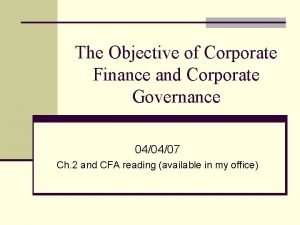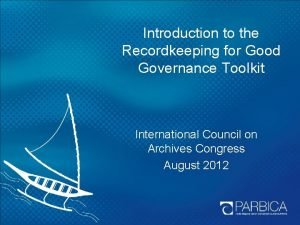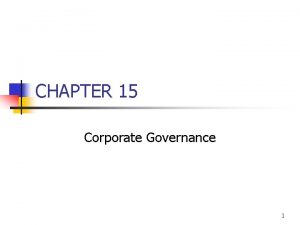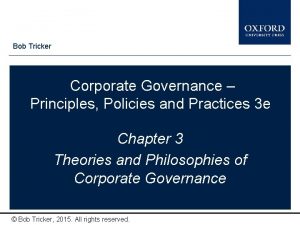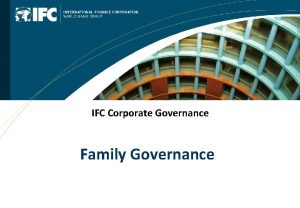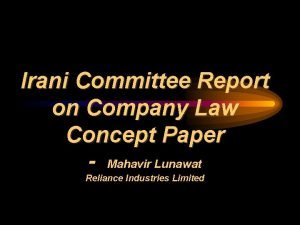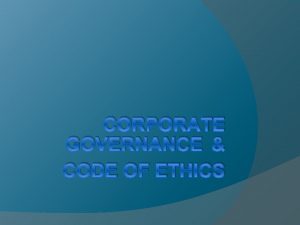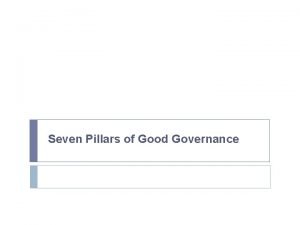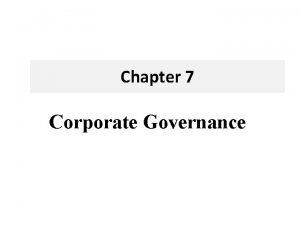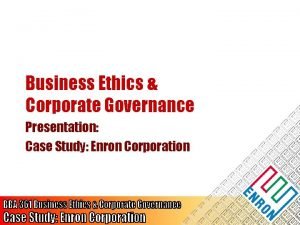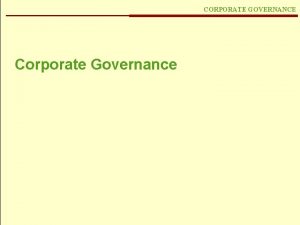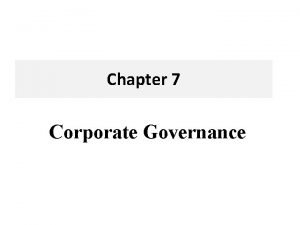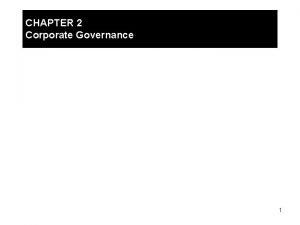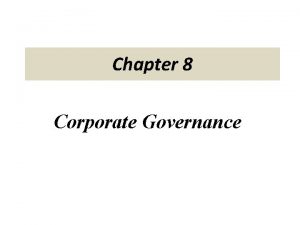CORPORATE GOVERNANCE REFORMS 1 CONFEDRATION OF INDIAN INDUSTRY



































- Slides: 35

CORPORATE GOVERNANCE REFORMS 1

CONFEDRATION OF INDIAN INDUSTRY CII CODE CII code was released in April 1998. (code for corporate governance. The Confederation of Indian Industry (CII) is an association of Indian businesses which works to create an environment conducive to the growth of industry in the country. CII is a non-government, not-for-profit, industry-led and industry-managed organization, playing a proactive role in India's development process. 2

CII recommendation for effective corporate governance Recommendation 1 There is no need to adopt the German system of two-tier boards to ensure desirable corporate governance. A single board, if it performs well, can maximise long term shareholder value just as well as a twoor multi-tiered board. Equally, there is nothing to suggest that a two-tier board, per se, is the panacea to all corporate problems. Recommendation 2 Any listed companies with a turnover of Rs. 100 crores and above should have professionally competent, independent, non- executive directors, who should constitute • at least 30 percent of the board if the Chairman of the company is a non-executive director, or • at least 50 percent of the board if the Chairman 3 and Managing Director is the same person. 7

Recommendation 3 No single person should hold directorships in more than 10 listed companies. Recommendation 4 For non-executive directors to play a material role in corporate decision making and maximising long term shareholder value, they need to • become active participants in boards, not passive advisors; • have clearly defined responsibilities within the board such as the Audit Committee; and • know how to read a balance sheet, profit and loss account, cash flow statements and financial ratios and have some knowledge of various company laws. 4

Recommendation 5 To secure better effort from non-executive directors, companies should: • Pay a commission over and above the sitting fees for the use of the professional inputs. • Consider offering stock options, so as to relate rewards to performance. Recommendation 6 While re-appointing members of the board, companies should give the attendance record of the concerned directors. If a director has not been present (absent with or without leave) for 50 percent or more meetings, then this should be explicitly stated in the resolution that is put to vote. As a general practice, one should not re-appoint any director who has not had the time attend even one half of the meetings. 5

Recommendation 7 Key information that must be reported to, and placed before, the board must contain: • Annual operating plans and budgets • Quarterly results for the company as a whole and its operating divisions or business segments. • Internal audit reports • Default in payment of interest or non-payment of the principal on any public deposit, creditor or f. I’s. • Any issue which involves possible public or product liability claims of a substantial nature • Details of any joint venture or collaboration agreement. • Transactions that involve substantial payment towards goodwill, brand equity, or intellectual property 6

Recommendation 8 1. Listed companies with either a turnover of over Rs. 100 crores or a paidup capital of Rs. 20 crores should set up Audit Committees within two years. 2. Audit Committees should consist of at least three members, all drawn from a company’s non-executive directors 3. To be effective, the Audit Committees should have clearly defined Terms of Reference and its members must be willing to spend more time on the company’s work 4. Audit Committees should assist the board in functions relating to financial statements and proposals that accompany the public issue of any security 5. Audit Committees should periodically interact with the statutory auditors and the internal auditors to ascertain the quality of the company’s accounts as well as the capability of the auditors themselves. 7 11

Recommendation 9 Under “Additional Shareholder’s Information”, listed companies should give data on: 1. High and low monthly averages of share prices 2. Greater detail on business segments Recommendation 10 1. Consolidation of Group Accounts should be optional and subjective 2. If a company chooses to voluntarily consolidate, it should not be necessary to represent the accounts of its subsidiary companies under section 212 of the Companies Act. 8

Recommendation 11 Major Indian stock exchanges should gradually insist upon a compliance certificate, signed by the CEOand the CFO, which clearly states that: • The management is responsible for the preparation, integrity and fair presentation of the financial statements and other information in the Annual Report Recommendation 12 For all companies with paid-up capital of Rs. 20 crores or more, the quality and quantity of disclosure that accompanies a GDR issue should be the norm for any domestic issue. Recommendation 13 Government must allow far greater funding to the corporate sector against the security of shares and other paper. 9

Recommendation 14 1. If any company goes to more than one credit rating agency, then it must divulge in the prospectus and issue document the rating of all the agencies that did such an exercise. 2. It is not enough to state the ratings. These must be given in a tabular format that shows where the company stands relative to higher and lower ranking. It makes considerable difference to an investor to know whether the rating agency or agencies placed the company in the top slots, or in the middle, or in the bottom. Recommendation 15 Companies that default on fixed deposits should not be permitted to • accept further deposits and make inter-corporate loans or investments until the default is made good; and • declare dividends until the default is made good. 10

Kumar Mangalam Birla committee report Kumar manglam Birla Committee appointed by the SEBI dwelt on the various aspects of corporate governance. A number of recommendation made by the Committee are common or similar to the C 11 Code described above, but in certain respects it has given more specific recommendations. However, in basic spirits both the reports are quite similar. In accordance with its terms of reference, the task of the committee was to suggest 1. Amendment to listing agreement and other measures to improve the standard of corporate governance; 2. A code of corporate best practices; and 3. Safeguards to deal with insider trading. The report lays down that its recommendations should be made applicable to all listed companies including their directors, managements, employees and professionals associated with the company. 11

The major recommendations of the committee are as follows. BOARD OF DIRECTORS Birla Committee report have recommended that the board of company should have an optimum combination of executive and non executive directors with 50% of the board consisting of non-executive directors. The number of independent directors would depend upon the chairman of the board. In case of non-executive chairman, at least one - third of the board should comprise of independent directors. In case of an executive chairman, at least 50% of the board should be independent. The tenure of the directors should be as per Companies Act. All transactions of the non-executive directors should be disclosed in the annual report. A nominee of one company is appointed as the director of a company he should assure the same accountability as any other director of the company. 12

AUDIT COMMITTEE The committee recommends the powers of the audit committee for maximum disclosure of information. The composition of the Audit Committee should be as follows: a) At least 3 non-executive directors as members. b) One of the independent directors as chairman. c)The finance director, head of the internal audit and a representative of external auditor as invitees at the meetings of the audit committee. d) The company secretary as the secretary of the committee. The committee should meet at least thrice in a year. One meeting must be held before finalization of annual accounts and one necessarily after 6 months. 13

REMUNARATION COMMITTEE The committee recommends that the company should have a credible and transparent remuneration policy on its directors. It asserts the company’s policy on remuneration package of executive directors. The remuneration of non executive directors should be decided by the entire board. Shareholders should be fully informed about the remuneration of directors. ACCOUNTING STANDARDS AND FINANCIAL REPORTING The committee recommends that, Companies which are required to give consolidated account of all its subsidiaries in which they hold 51% or more of its share capital. If the company is having several products and business the financial reporting of each product division should be available to the shareholders. 14

MANAGEMENT The board must clearly define the role of the management. Management comprise the Chief executive, executive directors and the key managers of the company, involved in the day-today activities of the company. The functions of management as recommend by the committee are the following v Providing necessary inputs in respect of company’s strategy policy etc. for decision making process. v Apply the policies and Code of Conduct of the Board. v Provide up to date and first hand information to the board in respect of financial matters. v Setting up internal control system for business requirements. v Focus on the day-to-day affairs in behalf of its shareholders. v Ensuring compliance of all rules and regulations v Facilitate efficient working of Board Committee 15

As a part of management disclosure, in addition to the Director’s Report, Management Discussion and Analysis Report (MDAR) should form a part of the annual report to the shareholders. MDAR should include the following: Industry structure and developments; Opportunities and threats, risks and concerns; Product wise performance; Internal control system; Operational performance; Financial performance; Number of workers employed. SHAREHOLDERS The company assumes that the shareholders are the owners of the company and as such they have certain rights and responsibilities. 16

As such the general body meeting provide an opportunity to the shareholders to address their concerns to the Board and comment on the overall functioning of the company on the basis of annual report. Shareholders should have right to participate in and have sufficient information on: a. Decisions concerning basic corporate changes; b. Takeovers, sale of assets or division of the company; c. Changes in capital structure which has the potential to bring about a change in control of the company. The committee observe the following actions taken by SEBI for strengthening the governance. • Disclosure norms for initial public offers. • Cash flow and fund flow statement in annual report. • Quarterly result performance. • Rules and regulations of transfer and transmission of shares. 17

• Sending the balance sheet copy to the shareholders. • Regulations on takeovers and acquisitions. • Preferential allotment procedure. The Companies Act 2013 emphasis the following matters for the strong Corporate Governance. • Every company is required to appoint one resident director on its board. • Nominee directors shall no longer be treated as independent director. • Listed companies and specific classes of public companies are required to appoint independent directors and woman directors on their board. • The companies act for the first time codifies the duties of directors. 18

NARAYAN MURTHY COMMITTEE REPORT SEBI Committee on Corporate Governance was constituted under the Chairmanship of N. R. Narayana Murthy, to look into: governance issues / review Clause 49, suggest measures to improve corporate governance standards. Ø The committee laid down some mandatory and non - mandatory recommendations. Ø 19

Audit committee Review of information by audit committees regarding › Financial statements and draft audit reports, including quarterly/half yearly information. › Management discussion and analysis of financial condition and the results of operations. › Report relating to compliance with laws and risk management. › Management letter/s of internal control weaknesses issued by statutory/internal auditors and › Records of related party transactions. � Financial literacy of members of the audit committee › All audit committee members should be “financially literate” and at least one member should have accounting or related financial management expertise. � 20

RELATED PARTY TRANSACTIONS A statement of all transactions with related parties including their bases (methodology) should be placed before the independent audit committee formal approval / ratification. If any transaction is not on an arm’s length basis, management should provide an explanation to the audit committee justifying the same. › The ‘arm's length’ is the condition or the fact that the parties to a transaction are independent and on an equal footing. � The term “related party” shall have the same meaning as contained in Accounting Standard 18, Related Party Transactions, issued by the Institute of Chartered Accountants of India. � Under AS 18, related party includes: › Enterprises, directly or indirectly, controlled by one or more other enterprises; › Associates or Joint Ventures of an enterprise; › Individuals who own interest in the voting power of an enterprise and are in a position to significantly influence the enterprise; › Key Management Personnel and their relatives; 21 › Enterprises which share common directors. �

RISK MANAGEMENT Procedures should be in place to inform Board members about the risk assessment and minimization procedures. These procedures should be periodically reviewed to ensure that executive management controls risk through means of a properly defined framework. � Management should place a report before the entire Board of Directors every quarter documenting the business risks faced by the company, measures to address and minimize such risks, and any limitations to the risk taking capacity of the corporation. � This document should be formally approved by the Board. � 22

PROCEEDS FROM INITIAL PUBLIC OFFERINGS Companies raising money through an Initial Public Offering (“IPO”) should disclose to the Audit Committee, the uses / applications of funds by major category (capital expenditure, sales and marketing, working capital, etc), on a quarterly basis. � On an annual basis, the company shall prepare a statement of funds utilised for purposes other than those stated in the offer document/prospectus. This statement should be certified by the independent auditors of the company. � The audit committee should make appropriate recommendations to the Board to take up steps in this matter. � 23

CODE OF CONDUCT • Lay down a code of conduct for all board members and senior management of the company • Posted on the company’s website • Affirm compliance with the code on an annual basis. • Annual report-declaration to this effect- signed off by the CEO NOMINEE DIRECTOR • Appointment should be made by the shareholders • Nominee of the Government shall be similarly elected and shall be subject to the same responsibilities and liabilities as other directors • Whistle blower policy to be in practiced in a company 24

J. J IRANI COMMITTEE, 2005 Government constituted a committee under the chairmanship of Dr. J. J Irani with a task of advising the government on the proposed revisions to the companies Act 1956. The objective was to have a simplified compact law that will be able to address the changes taking place in the national and international scenario, enable adoption of internationally accepted best practices as well as provide adequate flexibility for timely evolution of new arrangements in response to the requirements of ever changing business models. 25

RECOMMENDATIONS 1. Board Composition: Law Sh. Ould provide only the minimum number of directors necessary for various classes 0 f companies, There need not be any limit to maximum number of directors. Other than procedures for appointments, no age limit for directors need be specified in the Act. 2. Appointment and Resignation of Director: Every company to have at least one director resident in India. Requirement of obtaining approval of Central Government under Companies Act for appointment of non-resident managerial persons should be done away with. Duty to inform registrar regarding appointment resignation death etc. 26

3. Independent Directors: Presence of independent director on the boards of companies will lead to greater transparency in company’s dealings Law should recognize the principle of independent directors and spell out their attributes, role, qualifications, liability and manner of appointment along with the criteria of independence. 4, Remuneration of Directors: Decision on remuneration of directors should not be based on a ”Government approval based system” but should be left to the company. However, this should be transparent based on principles that ensure fairness, reasonableness and accountability and should be properly disclosed. No limits need to be prescribed. 5. Committees: Certain committees to be constituted with participation of independent directors should be mandated for certain categories of companies where the requirement of independent directors is mandated. In other cases constitution of m committees should be at the option of the company. 27

6. Law should specify the manner and composition of various committees of the Board like (i) Audit Committee (ii) Stakeholder's Relationship committee; and (iii) Remuneration Committee, along with obligation on the part of the company to consult them in certain matters. 7. disqualification of director: Failure to attend board meetings for a continuous period of one year to be made a ground for vacation of office regardless of whether or not leave for absence was granted to such director. Specific provisions to be made in the Law to regulate the process of resignation by a director or. 8: Board Meetings: Board meetings by electronic means to be allowed. In case of companies where independent directors are prescribed, notice period of 7 days has been recommended for Board meetings with provisions for holding emergency meetings at a shorter notice. Consent of shareholders by way of special resolution Should be mandatory for certain important matters. 28

9: Annual General Meetings: Use of postal ballot during meetings of members should be allowed to be more widely used by companies. Law should provide for voting through electronic mode. AGMs may be held at a place other than a place of registered office (in India) provided that at least 10% members in number reside at such place. 10. Appointment of MD / WTD: Managing Director (MD) / Whole Time Directors (WTD)/Executive Director (ED) should be in the whole time employment of only one company at a time. Provisions relating to options for appointment of directors through proportionate representation to be continued. 11. Key Managerial Personnel: Every company should be required to appoint, a Chief Executive Officer, Chief Finance Officer and Company Secretary as its key Managerial Personnel whose appointment and removal shall be by the Board of Directors. Special exemptions may be provided for small companies, who may obtain such services, as may be required from qualified professionals in practice. 29

NARESH CHANDRA COMMITTEE REPORT, 2002 The committee was appointed by the Securities and Exchange Board of India (SEBI) to make recommendations on the representation of independent directors on company boards and the composition of audit committees. The committee submitted its report on various aspects concerning corporate governance such as role, remuneration and training etc. of independent directors, audit committee, the auditors and then relationship with the company and how their roles can be regulated as improved. The committee stingily believes that ”a good accounting system is a strong indication of the management committee to governance". Good accounting means that it should ensure optimum disclosure and transparency, should be reliable and credible and should have comparability. According to the committee, the statutory auditor in a company is the 'lead actor’ in disclosure front and this has been amply recognized sections 209 to 223 of the companies act. 30

The chief aspects concerning the auditors functioning as per the act are: l. Auditors are fiduciaries of the shareholders not of the management as they are appointed as the shareholders appoint them. 2. Auditor’s independence is guaranteed as rules for removing on replacing an auditor as more stringent than for appointment. 3. The statutory auditor of a company can, at all times, have the right of access to all books of accounts and vouchers of a company and his repeat can be quite exhaustive to specify whether, the auditor could obtain from management all information and explanations that were necessary for the purpose of audit. 4. Proper books of accounts have been kept by the company. 5. Company accounts conform to accounting standards set by the Institute of Chartered Accountants of India. 31

Some mandatory functions are; 1. The adequacy of internal control commensurate to the size of the company and its business. 2. The adequacy of records maintained on fixed assets and inventories and whether any assets were re-valued during the year. 3. Loans and advances that were given by the company, and whether the parties concerned were regular in repaying the principal and interest. 4. Loans and advances by the company and whether these were at terms in judicial to the interest of the company and also whether these were being property repaid according to conducted schedules. 32

Some mandatory functions are; Cont. 5. Transactions including loans and advances, with related parties as defined by section 301 of the Companies Act. Fixed deposits accepted by the company from the public and if so, whether these conform to the provisions laid down by section 58 A of Companies Act. 6. Regularity of depositing of provident fund dues and whether the Employees’ State Insurance Act 1948, was applicable to the company. 7. No personal expenses of directors and employees were charged to the profit and loss account. 33

Guidelines of Committee to Auditors: 1. For the public to have confidence in the quality of audit, it is essential that auditors showed always be and be seen to be independent of the company, which includes integrity, professional ethics and objectivity. 2. Before taking any work auditor must consider that there should not be any threat to his independence. And if it present he should adopt risk aversion virtue. 3. Where such treats exist the auditor should either resist from the task or, at the very least, but in place safeguards that criminate them to reduce threats to clearly insignificant levels. For the auditor is unable to fully implement credible and adequate safeguards then he must not to do the work. 34

THANK YOU 35
 Kumar mangalam birla committee
Kumar mangalam birla committee Corporate finance objectives
Corporate finance objectives Corporate governance tool kit
Corporate governance tool kit Oecd corporate governance definition
Oecd corporate governance definition Hp corporate governance
Hp corporate governance Corporate governance strategic management
Corporate governance strategic management Corporate governance chain
Corporate governance chain Potential problems in corporate governance
Potential problems in corporate governance Rules based approach to corporate governance
Rules based approach to corporate governance Bob tricker corporate governance
Bob tricker corporate governance Corporate governance and economic growth
Corporate governance and economic growth Objective of corporate finance
Objective of corporate finance Oecd corporate governance principles
Oecd corporate governance principles Family governance definition
Family governance definition Jj irani committee recommendations
Jj irani committee recommendations Good governance and corporate social responsibility
Good governance and corporate social responsibility 5 driving forces of csr
5 driving forces of csr P&g code of conduct
P&g code of conduct Insider and outsider system of corporate governance
Insider and outsider system of corporate governance Examples of agency problems
Examples of agency problems Role of corporate governance in strategy formulation
Role of corporate governance in strategy formulation Pillars of governance
Pillars of governance Basel committee corporate governance
Basel committee corporate governance Paul ruthman committee
Paul ruthman committee Corporate governance clause 49
Corporate governance clause 49 Oecd guidelines on corporate governance
Oecd guidelines on corporate governance Corporate governance in sri lanka
Corporate governance in sri lanka Latar belakang munculnya gcg
Latar belakang munculnya gcg Agency theory examples
Agency theory examples Corporate governance triangle
Corporate governance triangle Ultimate beneficial owner secp
Ultimate beneficial owner secp Corporate governance definition
Corporate governance definition Global corporate governance forum
Global corporate governance forum Enron presentation
Enron presentation Isu dan riset kontemporer corporate governance
Isu dan riset kontemporer corporate governance Corporate governance is a form of
Corporate governance is a form of

